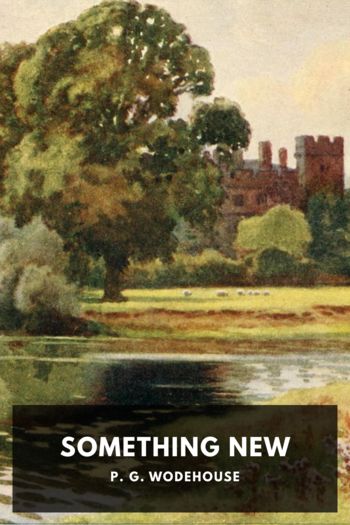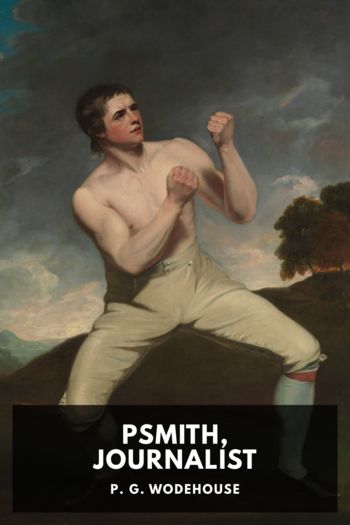Leave It to Psmith - P. G. Wodehouse (i wanna iguana read aloud .TXT) 📗

- Author: P. G. Wodehouse
Book online «Leave It to Psmith - P. G. Wodehouse (i wanna iguana read aloud .TXT) 📗». Author P. G. Wodehouse
“Liz!”
“Eddie!” ejaculated Miss Peavey faintly, and sat down in a heap on a grassy bank.
IV“Well, for goodness’ sake!” said Miss Peavey.
Shropshire had become static once more. She stared at him, wide-eyed.
“Can you tie it!” said Miss Peavey.
She ran her gaze over him once again from head to foot.
“Well, if this ain’t the cat’s whiskers!” said Miss Peavey. And with this final pronouncement she rose from her bank, somewhat restored, and addressed herself to the task of picking up old threads.
“Wherever,” she inquired, “did you spring from, Ed?”
There was nothing but affection in her voice. Her gaze was that of a mother contemplating her long-lost child. The past was past and a new era had begun. In the past she had been compelled to describe this man as a hunk of cheese and to express the opinion that his crookedness was such as to enable him to hide at will behind a spiral staircase; but now, in the joy of this unexpected reunion, all these harsh views were forgotten. This was Eddie Cootes, her old sidekick, come back to her after many days, and only now was it borne in upon her what a gap in her life his going had made. She flung herself into his arms with a glad cry.
Mr. Cootes, who had not been expecting this demonstration of esteem, staggered a trifle at the impact, but recovered himself sufficiently to return the embrace with something of his ancient warmth. He was delighted at this cordiality, but also surprised. The memory of the lady’s parting words on the occasion of their last meeting was still green, and he had not realised how quickly women forget and forgive, and how a sensitive girl, stirred by some fancied injury, may address a man as a pie-faced plugugly and yet retain in her inmost heart all the old love and affection. He kissed Miss Peavey fondly.
“Liz,” he said with fervour, “you’re prettier than ever.”
“Now you behave,” responded Miss Peavey coyly.
The arrival of a baaing flock of sheep, escorted by a priggish dog and followed by a couple of the local peasantry, caused an intermission in these tender exchanges; and by the time the procession had moved off down the road they were in a more suitable frame of mind to converse quietly and in a practical spirit, to compare notes, and to fill up the blanks.
“Wherever,” inquired Miss Peavey again, “did you spring from, Ed? You could of knocked me down with a feather when I saw you coming along the road. I couldn’t have believed it was you, this far from the ocean. What are you doing inland like this? Taking a vacation, or aren’t you working the boats any more?”
“No, Liz,” said Mr. Cootes sadly. “I’ve had to give that up.”
And he exhibited the hiatus where an important section of his finger had been and told his painful tale. His companion’s sympathy was balm to his wounded soul.
“The risks of the profession, of course,” said Mr. Cootes moodily, removing the exhibit in order to place his arm about her slender waist. “Still, it’s done me in. I tried once or twice, but I couldn’t seem to make the cards behave no more, so I quit. Ah, Liz,” said Mr. Cootes with feeling, “you can take it from me that I’ve had no luck since you left me. Regular hoodoo there’s been on me. If I’d walked under a ladder on a Friday to smash a mirror over the dome of a black cat I couldn’t have had it tougher.”
“You poor boy!”
Mr. Cootes nodded sombrely.
“Tough,” he agreed, “but there it is. Only this afternoon my jinx gummed the game for me and threw a spanner into the prettiest little scenario you ever thought of … But let’s not talk about my troubles. What are you doing now, Liz?”
“Me? Oh, I’m living near here.”
Mr. Cootes started.
“Not married?” he exclaimed in alarm.
“No!” cried Miss Peavey with vehemence, and shot a tender glance up at his face. “And I guess you know why, Ed.”
“You don’t mean … you hadn’t forgotten me?”
“As if I could ever forget you, Eddie! There’s only one tintype on my mantelpiece.”
“But it struck me … it sort of occurred to me as a passing thought that, when we saw each other last, you were a mite peeved with your Eddie …”
It was the first allusion either of them had made to the past unpleasantness, and it caused a faint blush to dye Miss Peavey’s soft cheek.
“Oh, shucks!” she said. “I’d forgotten all about that next day. I was good and mad at the time, I’ll allow, but if only you’d called me up next morning, Ed …”
There was a silence, as they mused on what might have been.
“What are you doing, living here?” asked Mr. Cootes after a pregnant pause. “Have you retired?”
“No, sir. I’m sitting in at a game with real worthwhile stakes. But, darn it,” said Miss Peavey regretfully, “I’m wondering if it isn’t too big for me to put through alone. Oh, Eddie, if only there was some way you and me could work it together like in the old days.”
“What is it?”
“Diamonds, Eddie. A necklace. I’ve only had one look at it so far, but that was enough. Some of the best ice I’ve saw in years, Ed. Worth every cent of a hundred thousand berries.”
The coincidence drew from Mr. Cootes a sharp exclamation.
“A necklace!”
“Listen, Ed, while I slip you the low-down. And, say, if you knew the relief it was to me talking good United States again! Like taking off a pair of tight shoes. I’m doing the high-toned stuff for the moment. Soulful. You remember, like I used to pull once or twice in the old days. Just after you and me had that little spat of ours I thought I’d





Comments (0)